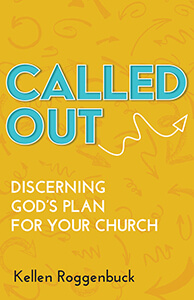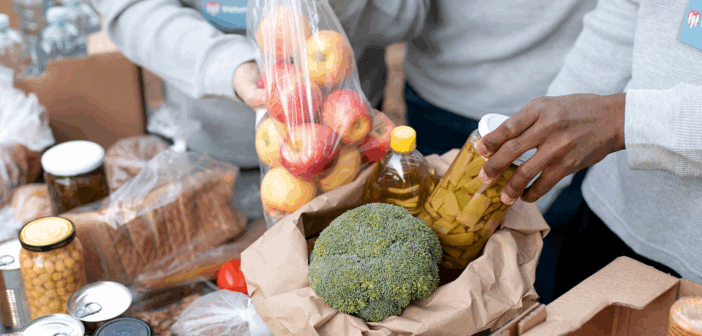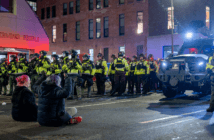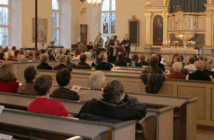Pastor Kellen Roggenbuck writes about one of many examples that led him to give more attention to the clues God is giving us, often from laity, for next faithful steps in our congregational witness. He encourages the practice of discernment where we acknowledge that God takes the lead while inviting the faithful to join God’s redemptive work.
Theologian Frederick Buechner defines vocation as the place where “your deep gladness and the world’s deep hunger meet.” Many of us came to understand this as a foundational concept for our own call to ministry. What we might have overlooked is how we can use this same understanding of call and purpose for something greater than our personal vocation. It is easy for churches to become so focused on weathering institutional turmoil that we become oblivious to the calls to our church and laity.
In the midst of the COVID-19 shutdown, when the church wasn’t meeting in-person and most of our ministries were on hold, I got a call from a peripheral church member who had in the past several years been attending another church. She asked me, “Have you ever heard of Ruby’s Pantry?” I had not, and she went on to rapidly and enthusiastically explain that Ruby’s Pantry is a food-share program designed to combat food insecurity in the Midwest. She went on to say that the program would be perfect for our region, a community that was struggling through the pandemic, and that this would be a perfect opportunity for our church to execute its mission and vision.
It was evident that she was deep in the process of discernment. Her own deep gladness had aligned with our church’s deep gladness and intersected with the deep needs related to food insecurity in our community. She had done the foot work and asked the ”Why now, why us, why here?” questions and was ready to collaborate in the discernment. She invited me to ask those questions too. After my own discernment and reflection, I asked, “How can the church help you lead this?” We were able to recruit a team of volunteers to facilitate the new missional expression, partner with the community and local resources, visit other Ruby’s Pantry sites to learn from their experiences, adapt to our context and skills, and ultimately build what we believed God had called us to build.
This Ruby’s Pantry site was able to accommodate a maximum of 350 households with food that first month. We learned from some system failings and details we had overlooked at that first event, and the next month we were able to serve more in less time. Each time we met as a board, we spent time reflecting on what we believed God wanted us to accomplish and how we could do that better, faster, or bigger next time. Within three months, we were serving over 600 households through a small army of volunteers from the church and wider community. Within another two months, 750 food insecure households from all around Southern Wisconsin had a pantry full of food because of the diligent work of a few laypeople following God’s call. We worked hard to execute each month better than the previous, keeping wait times as low as possible, moving cars as efficiently as possible, and always approaching debriefing meetings with an attitude of openness to what God might be inspiring us to do. differently.
My job as the pastor throughout was to speak on behalf of the church’s mission and vision and to continually ask the question, “How can the church help you lead this?” I didn’t talk over or lead the team. I didn’t muscle in and force my own ideas on the group, Most months, my only job was to show up on the day and run one of multiple groups of volunteers, and that was less because I am the pastor and more because of my previous experience running volunteers at these types of events. I partnered with laity to discern a call to the ministry of Ruby’s Pantry in our local community and stayed true to that partnership as it thrived.
When this is all done well, new expressions can do so much more. When we unleash the laity with full support and trust of the faith community to follow where God leads, the results are nothing short of miraculous. During a global pandemic, this site processed over half a million dollars of food, distributed to hundreds of households, connected with over 100 volunteers from every corner of the community, and partnered with a half-dozen other food pantries and government programs on a monthly basis, all beginning with a layperson who felt the call from God to connect her great gladness with the church to the deep need within the community.
God took hold of this new missional expression and multiplied it over and over, leading to new relationships with nonprofits and pantries to create an even wider net of support for the community’s hunger needs. God called, God nurtured, and God multiplied. The laity brought the church along for the ride, and the world was changed.
 This article is adapted from Called Out: Discerning God’s Plan for Your Church (Abingdon Press, 2025) by Kellen Roggenbuck. The book is available from the publisher, Cokesbury, and Amazon. Used by permission.
This article is adapted from Called Out: Discerning God’s Plan for Your Church (Abingdon Press, 2025) by Kellen Roggenbuck. The book is available from the publisher, Cokesbury, and Amazon. Used by permission.
Related Resources
- Planning Inspired by The Spirit by Myung Sun Han
- Community Led by The Spirit by Lewis A. Parks
- Moving Beyond a Congregational Identity Crisis by Doug Powe
If you would like to share this article in your newsletter or other publication, please review our reprint guidelines.






